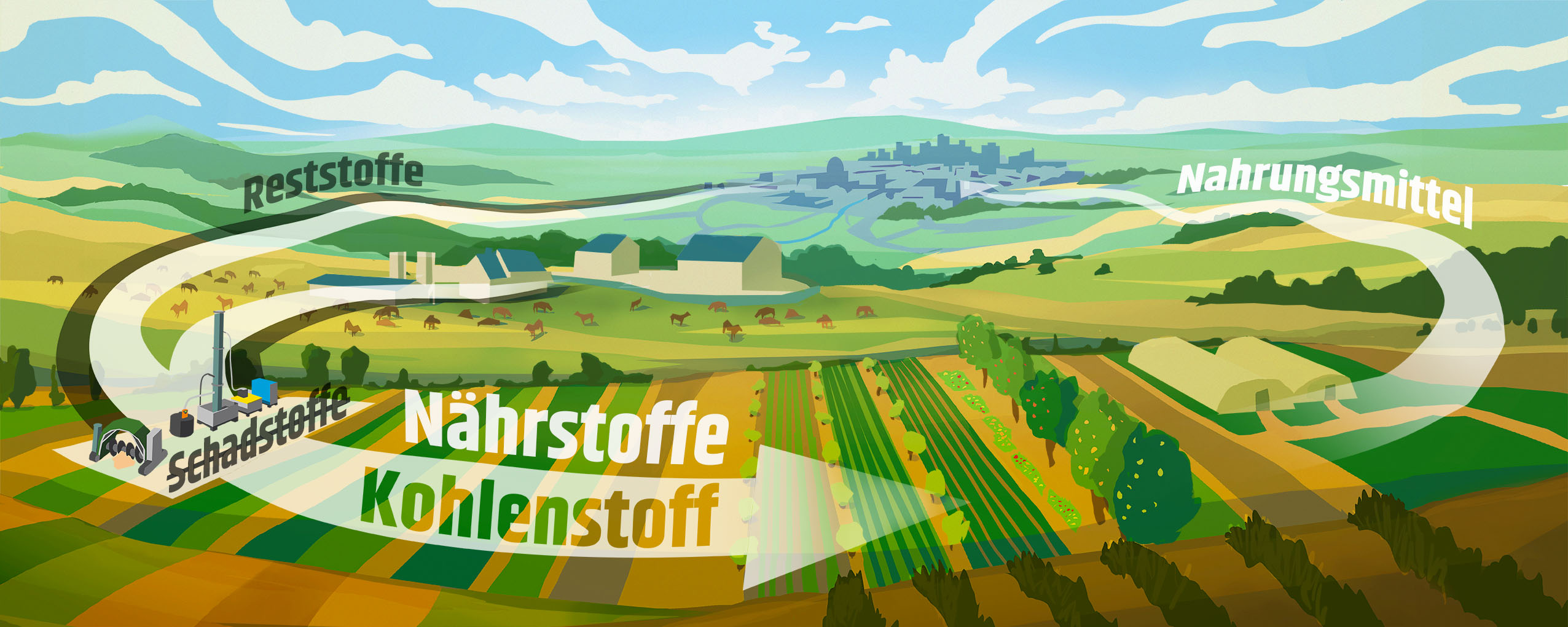Dry separation toilets, humus racks and urine-based fertilisers – scientists from the interdisciplinary BMBF project ‘zirkulierBAR’ have been researching the processing of human excrement into recycled fertiliser and its agricultural use for over three years. The result: recycled fertilisers are a promising contribution to the sanitation of the future and offer advantages for agriculture.
Großbeeren/Germany, December 17th, 2024 ‘There is a lot of potential in recycled fertilisers. If nutrients from faeces and urine are collected and processed separately and end up on the fields in a quality-assured manner, they can make an important contribution to the supply of fertilisers. We can also save water and reduce water pollution,’ summarises Ariane Krause, scientist at the Leibniz Institute of Vegetable and Ornamental Crops (IGZ) and coordinator of zirkulierBAR. ‘In addition, recycled fertilisers reduce dependence on imports of rock phosphate and natural gas, which are needed to produce synthetic fertilisers.’ The expansion of alternative sanitation systems therefore closes cycles in the use of resources such as water and plant nutrients. With the socio-technical relevance and socio-political acceptance, the research also focussed on the social transformation process.
The zirkulierBAR research project was funded by the Federal Ministry of Education and Research (BMBF) as part of the REGION.innovativ funding programme and coordinated by the Leibniz Institute of Vegetable and Ornamental Crops (IGZ). It was designed to run for three years and ends at the end of December 2024.
The most important results at a glance:
In Eberswalde, a recycling plant for the contents of dry separation toilets was set up. Urine and faeces are collected here, cleaned and processed as recycled fertiliser. The plant will continue to be operated by Finizio – Future Sanitation and Kreiswerke Barnim and is the first of its kind in Germany. It will continue to produce humus fertiliser and urine-based fertiliser with scientific support from the EU-funded P2Green project.
‘Our recycled fertilisers are harmless in terms of health and hygiene. They comply with the strict limits of waste and fertiliser legislation,’ says Krause, referring to the tests carried out by the DBFZ (German Biomass Research Centre) and the Technical University (TU) of Berlin. The recycled fertiliser and its source materials (urine and faeces, green waste, clay, straw, biochar) were sampled and analysed with regard to nutrients, heavy metals, germs, pharmaceutical residues and other organic pollutants. The study with measurement data and results is available here.
Tests carried out by the Eberswalde University for Sustainable Development (HNE) in the field and in the greenhouse also show that recycled fertilisers pose no risk to the soil, plants or ecosystem. Their fertilising effect is comparable to that of other organic or synthetic fertilisers. The fertiliser from urine in particular provides valuable nutrients for plant growth, while the fertiliser from the solids contributes to soil humus maintenance in the long term. The study on the fertiliser effect on the field is available here.
‘Some people are initially sceptical when they hear about our dry separation toilets. But social acceptance of alternative sanitary systems is growing all the time.’ Ariane Krause refers to the representative survey of 2,000 respondents conducted by the Fraunhofer Centre for Responsible Research and Innovation (CeRRI) in 2022. Over 50 per cent of respondents were open to using separating toilets and recycled fertilisers in food production. The results of the survey are available at (https://data.mendeley.com/datasets/fjv2bf6mh2/2)
Local authorities also play a key role in transformation processes towards greater sustainability. The nationwide zirkulierBAR transfer network (https://zirkulierbar.de/beobachtende-kommunen/) connects municipalities that want to take the first steps towards a nutrient cycle. It will continue to work after the end of the zirkulierBAR programme.
The use of alternative sanitation systems is still limited, mainly due to the lack of a legal framework. ‘We finally need an adequate legal framework for resource-orientated sanitation systems. Other European countries such as France and Austria are ahead of Germany in this respect and already recognise the potential of alternative sanitation systems,’ explains Krause. ‘The current government has not managed to adapt the regulations accordingly, even though the first important steps have been taken. A new federal government could pick up the thread here to give these promising innovations a chance.’
All results from zirkulierBAR can be found in the publication: Back to the cycle – Handbook for the sanitary and nutrient turnaround. The practical guide is aimed at municipal employees, planners, agriculture and politics as well as all interested parties. The second, expanded version is available to download free of charge. The handbook will also be available in printed form from NetSan e.V. from January.
Translated with DeepL_com
Originalpublication:
(https://www.naehrstoffwende.org/zirkulierbar-handbuch/) Link zum Download des Handbuchs
ImageSource: Leibniz-Institut für Gemüse- und Zierpflanzenbau



Schreibe einen Kommentar